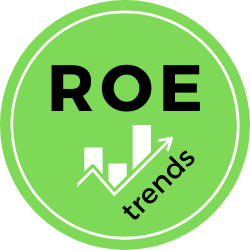Salesforce Stock Analysis

Salesforce, Inc. (CRM) is a global leader in customer relationship management (CRM) solutions. Its cloud-based software empowers businesses of all sizes to connect with customers, streamline operations, and drive growth. From being a disruptive innovator in the CRM space to becoming a dominant force in cloud computing, Salesforce has continuously pushed technological boundaries. This Salesforce stock analysis evaluates its financial performance, Return on Equity (ROE) trends, strategic initiatives, strengths, weaknesses, and its position in a competitive market.
Why ROE Matters in Salesforce Stock Analysis
Return on Equity (ROE) is a crucial metric in Salesforce stock analysis. It measures the company’s ability to generate profits relative to shareholders’ equity. A higher ROE typically reflects effective management and strong financial performance. For Salesforce, ROE serves as an essential indicator of profitability and its efficiency in utilizing equity to generate returns for investors.
Salesforce Stock Analysis: ROE Trends Over the Years
| Year | ROE (%) |
| 2013 | 4.8 |
| 2014 | 5.5 |
| 2015 | 6.2 |
| 2016 | 7.1 |
| 2017 | 6.8 |
| 2018 | 7.5 |
| 2019 | 8.9 |
| 2020 | 10.2 |
| 2021 | 11.5 |
| 2022 | 10.8 |
| 2023 | 12.1 |
| 2024 | 13.5 (Projected) |
Key Insights from the Salesforce Stock Analysis
- Consistent Growth: Salesforce’s ROE has steadily increased over the past decade, reflecting its ability to innovate and execute its growth strategy effectively.
- Recent Momentum: ROE has exceeded 10% in the last three years, driven by strategic initiatives like Slack integration and expanded market reach.
- Positive Outlook: The projected ROE of 13.5% for 2024 demonstrates Salesforce’s continued focus on operational efficiency and profitability.
Salesforce Stock Analysis: Strengths
- Market Leadership: As the global CRM market leader, Salesforce enjoys unparalleled brand recognition and a large, loyal customer base.
- Cloud-First Approach: Salesforce’s robust and scalable cloud platform ensures high availability, flexibility, and accessibility for businesses worldwide.
- Strategic Acquisitions: Investments in companies like Tableau (data visualization) and Slack (collaboration) have strengthened Salesforce’s product offerings and market position.
- Commitment to Sustainability: Salesforce’s focus on ethical operations, diversity, and environmental sustainability enhances its reputation among socially conscious consumers and investors.
Salesforce Stock Analysis: Weaknesses and Challenges
- Intense Competition: The enterprise software market is fiercely competitive, with Salesforce facing challenges from tech giants like Microsoft, Oracle, and SAP.
- Subscription Dependency: A reliance on recurring subscription revenue makes Salesforce vulnerable to economic fluctuations and customer retention risks.
- Integration Complexities: Managing a growing portfolio of acquisitions can create challenges in ensuring seamless integration and consistent user experiences.
- Premium Pricing: High service costs may deter small to mid-sized businesses, limiting Salesforce’s market accessibility.
Salesforce Stock Analysis: Competitive Landscape
Salesforce operates in a competitive environment, contending with other major players in cloud computing and enterprise software:
- Microsoft: Offers integrated CRM and cloud solutions through Dynamics 365 and Azure, posing a significant challenge to Salesforce’s dominance.
- Oracle: Combines robust enterprise applications with a growing cloud infrastructure, competing directly with Salesforce in the software market.
- SAP: With its cloud-based ERP and CRM solutions, SAP is a strong competitor in the enterprise sector.
- Adobe: Provides customer engagement and marketing solutions that overlap with Salesforce’s offerings through its Experience Cloud.
Salesforce Stock Analysis: Strategic Projects and Innovations
- Customer 360: Integrates data from various sources to offer a single view of the customer, enabling businesses to deliver personalized experiences.
- Einstein AI: Enhances the platform with predictive analytics, automation, and personalized insights, positioning Salesforce as an AI leader in the CRM space.
- Slack Integration: Drives workplace productivity and collaboration by integrating Slack into Salesforce’s ecosystem.
- Industry-Specific Solutions: Tailored products for sectors like healthcare, retail, and financial services broaden Salesforce’s market reach and relevance.
Salesforce Stock Analysis: Future Prospects
Salesforce’s future depends on its ability to innovate and adapt to the evolving technology landscape. Several factors will shape its trajectory:
- Cloud Adoption Growth: Salesforce is well-positioned to capitalize on the increasing global demand for cloud computing and CRM solutions.
- AI and Emerging Technologies: Integrating artificial intelligence, blockchain, and other emerging technologies will be critical for Salesforce’s growth and competitive differentiation.
- Global Expansion: Expanding into new markets, especially in emerging economies, offers significant growth potential.
- Sustainability Initiatives: As environmental and social governance (ESG) factors gain importance, Salesforce’s strong sustainability record will appeal to investors.
Is Salesforce Stock a Good Investment?
Salesforce continues to dominate the CRM market while expanding into adjacent spaces through innovation and strategic acquisitions. Its improving ROE and robust strategic initiatives underscore its financial health and market leadership.
However, investors should weigh the potential risks, including competitive pressures, macroeconomic uncertainties, and the challenges of integrating acquisitions. For those seeking exposure to the cloud computing and enterprise software sectors, Salesforce presents a promising long-term investment opportunity.
In conclusion, this Salesforce stock analysis highlights the company’s strong fundamentals, innovative strategies, and potential for sustained growth in a dynamic technology market.

